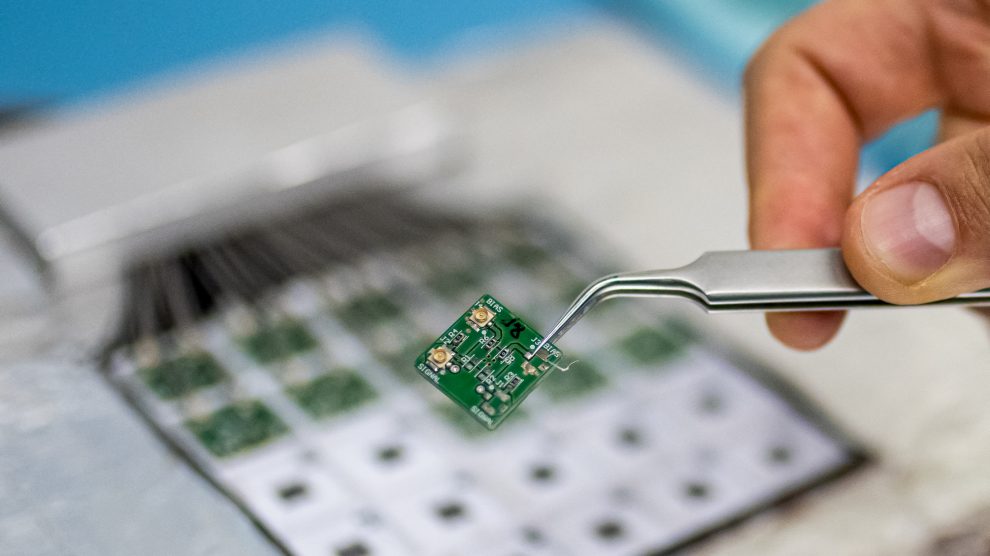Emerging Europe’s start-up scene is thriving: new money and new ideas are coming onto the market all the time. To keep you up to date with the latest investments, innovations, movers and shakers, each Monday Emerging Europe brings you a round-up of the region’s start-up news.
GScan: Estonian deep tech improving safety and efficiency in security and cargo scanning
GScan, a deep tech company that develops atmospheric ray 3D scanners for security and cargo scanning, last week announced an investment round worth 1.4 million euros, taking the total value of the firm past 18 million euros.
The start-up works with customs, defence agencies, security companies, universities, and research centres across the world to develop state-of-the-art atmospheric ray 3D scanners. The systems are autonomous, able to identify the chemical composition of scanned objects, and fit well within existing infrastructure to enable quick adoption.
GScan aims to deliver its first industry prototypes by autumn 2022.
GScan’s technology uses natural atmospheric rays, and tests have shown more than 95 per cent efficiency in detecting hazardous materials. Atmospheric rays are the natural flux of particles originating from the upper atmosphere. Since atmospheric rays are natural, these are safe for scanning humans. They allow clients to avoid costly certifications, safety training of operators and to implement fully automated scanner gates.
The developed hardware works with small parcel scanners to large truck and sea container scanners alike. It makes the product scalable beyond security and cargo scanning and applicable to many other industries in the future, such as construction industry and medicine. The new scanner technology can be applied in public public space with no restrictions and it works through any shielding. Its AI-driven material and object recognition allows fully automated inspection flow.
According to Andi Hektor, a co-founder of GScan: “The increased concerns on safety and smuggling have led us to focus on creating a safer future. Our scanners offer a harmless and automated solution against the smuggling of weapons, explosives, illegal goods and people. We can use our tech to see ‘through’ packages, vehicles and containers. Worrying about the after-war-zones in Ukraine, earthquakes or just ageing ferro-concrete – we can inspect buildings and bridges to make sure their structure is safe and durable.”
As public safety has become a global priority, the European Commission signed an agreement with the University of Tartu, GScan, and several partners in May 2021 to support a joint international project, called SilentBorder, with 7.5 million euros.
The project will run through 2025 and result in a large scanner for sea containers and trucks. Since January 2022 GScan has been running a project to build a small scanner system for parcels and smaller items. Extra support of 1.5 million euros for this project comes from Enterprise Estonia.
Paysend opens new European Technology Centre in Belgrade
Paysend, the global fintech with seven million customers, last week announced that it has opened its new European Technology Centre in Belgrade, Serbia. The new technology hub will focus on software and product development and embraces Serbia’s reputation as Europe’s next technology hotspot, with a growing community of established brands, venture capital firms and fintech start-ups being drawn to the country to take advantage of its convenient location and domestically-grown, internationally acclaimed technology talent pool.
The technology sector has become a critical part of the social and economic fabric of Serbia and will be crucial to the country’s ongoing development and economic growth.
“Digitalisation and the fourth industrial revolution has provided a unique opportunity for Serbia and its citizens to leapfrog other countries, particularly in the fields of technology, innovation, foreign direct investment and R&D,” says Ana Brnabić, Serbia’s prime minister.
“Serbia’s ability to attract leading technology and fintech companies, like Paysend, is evidence of the strategic investments we have made in recent years to develop and strengthen the technology and startup ecosystems in Serbia.”
In addition to a committed government and political stability to support digital transformation Serbia has excellent talent from world-recognised universities and prestigious tech multinationals, a strategic location able to simultaneously support European, American, and Asian operations, and an undersaturated market for technology development with room for growth.
Paysend will look to directly contribute to some of the innovative technology-focussed initiatives already underway across Serbia, including working with the National Bank of Serbia to test payment solutions and products in the bank’s payment regulatory sandbox, as well as joining the Digital Serbia Initiative, a non-profit that hosts events for students, helps to shape fintech laws, as well as develop Serbia’s digital economy.
Abdul Abdulkerimov, co-founder and chairman at Paysend, says: “As a global fintech, choosing Belgrade as the location for Paysend’s primary European technology hub was an easy decision given the growing infrastructure and support that the government of the Republic of Serbia is providing to encourage the growth of technology and start-ups.
“Working in partnership with the government we want to help put Belgrade on the map as the next fintech capital of Europe. We look forward to establishing ourselves in Belgrade and contributing to the goal of developing a strong, globally competitive digital economy in Serbia.”
Paysend will look to grow its headcount in Belgrade to up to 100 people by the end of 2022.
Unlike many news and information platforms, Emerging Europe is free to read, and always will be. There is no paywall here. We are independent, not affiliated with nor representing any political party or business organisation. We want the very best for emerging Europe, nothing more, nothing less. Your support will help us continue to spread the word about this amazing region.
You can contribute here. Thank you.



